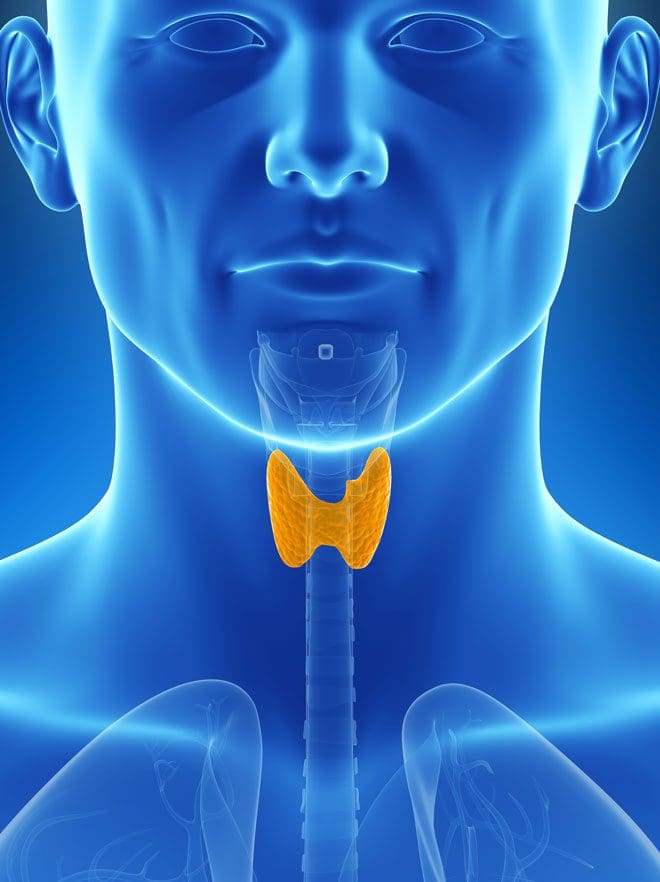Case study: Weight loss in a patient with an underactive thyroid
By naturopath Margaret Jasinska
Allison is a 42 year old lady who came to see me a month ago, after being frustrated with her weight for many years. She claimed to eat well but was gaining a few kilos every year. Both of her parents are slim people, so Allison was convinced there must be an explanation for the surplus 22 kilos she wanted to lose.
Allison’s mother had a thyroid problem when she was younger and had her thyroid gland removed. Allison hadn’t had a blood test for her thyroid for more than five years. She asked for some comprehensive blood tests to try and get to the bottom of her problems.
Life is frantically busy for Allison. She lives with her partner and doesn’t have children. Allison is self-employed and works extremely long hours. She told me she gets an average of four to five hours of sleep each night. That is nowhere near enough. Insufficient sleep is an extremely common cause of inability to lose weight. That’s because it messes up your appetite hormones. Insulin, leptin and ghrelin all help you feel satisfied after meals if they are working properly. People who don’t sleep enough inevitably develop some degree of insulin resistance. That means their blood insulin goes up. That’s bad news because insulin promotes fat storage (particularly around the torso) and it inhibits the fat burning hormone called hormone-sensitive lipase from working.

I arranged for Allison to have a blood test and here are her results:
- Fasting insulin 14. An ideal insulin level is below 10. Her result did indicate that Allison had insulin resistance. That means she was eating more carbohydrate than her body can tolerate. I asked her to follow the lower carbohydrate eating plan in the book I Can’t Lose Weight and I Don’t Know Why.
- Vitamin D 51. An ideal vitamin D blood level is between 100 and 150 nmol/L. I was surprised her vitamin D level wasn’t even lower, considering Allison spends all day working on her computer. Insufficient vitamin D can slow down metabolism. I discussed safe, sensible sunshine exposure and vitamin D supplementation with her.
- DHEA 2.1 umol/L. This was below normal. DHEA is a hormone made by the adrenal glands that helps to give us energy, stamina and strength. Allison had been burning the candle at both ends for a long time, and not sleeping enough, so it’s no wonder her DHEA was low. I gave her a prescription for bio-identical DHEA, which she got from a compounding chemist.
- TSH 4.9 mIU/L. Allison’s thyroid gland was under active. Her T3 and T4 levels were normal, however the TSH is consistent with symptoms such as fatigue, inability to lose weight, fluid retention and mild depression. I gave Allison nutrients to help support thyroid hormone production, as well as a prescription for natural thyroid hormone. I also gave her a referral to have a blood test for thyroid antibodies, to check if she has the autoimmune disease Hashimoto’s thyroiditis.
Allison didn’t have a bad diet. She did eat out a lot, and had big portions, plus she told me she drank too much alcohol and knew this was impairing her metabolism. Allison mentioned that she used a protein powder, and she showed me the tub. The protein powder contained gluten and sugar – both completely inappropriate for someone with a thyroid problem who can’t lose weight. I suggested she make smoothies using Synd-X Slimming Protein powder, which is gluten free and sweetened with stevia.
Allison was happy to have a plan in place to address her weight and overall health. I look forward to our next consultation in two weeks. For more information about thyroid conditions, see the book Your Thyroid Problems Solved.








Is Dr Cabot still doing consults. I flew from Kalgoorlie to Adelaide to see her a number of years ago and the trip was worth every cent. Now I need some direction again with my weight and health.
Hi Lesley,
Dr Cabot offers phone consultation. You can call our office on 02 4655 8855.
Kind regards,
Louise
Thank you I will call tomorrow 7/3/2025